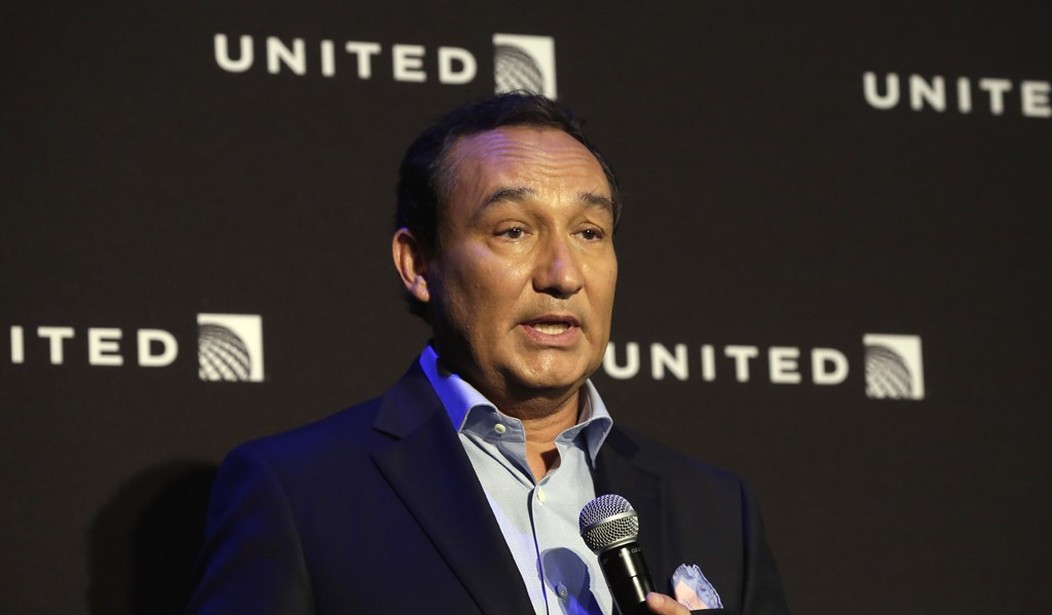Gee, where have we heard this before? On Tuesday, United CEO Oscar Munoz told reporters and analysts on an earnings-report conference call that he would personally see to it that there would be no repeat of the incident in Chicago in which police assaulted and dragged a paying customer off their flight. When asked whether anyone would get fired over the viral-video event, Munoz said that had never even been considered. It wasn’t the fault of anyone in particular … it was the system:
The CEO of United Airlines says no one will be fired over the dragging of a man off a plane — including himself. …
Munoz’s early statements on the incident were widely criticized. He initially supported employees and blamed Dao, calling him “disruptive and belligerent.” On Tuesday, he was asked if the company ever considered firing anyone, including management.
“I’m sure there was lots of conjecture about me personally,” said Munoz. He noted that the board of United Continental Holdings Inc. has supported him.
“It was a system failure across various areas,” Munoz continued. “There was never a consideration for firing an employee.”
Ahem. The problem with this explanation is so obvious that it’s almost trite to explain, but the problem is so ubiquitous that we don’t think about it. What, pray tell, is “the system”? We could call it Soylent Green, because it’s made of people. A system failure in this sense (as opposed to mechanical or computer failure) is a failure of personnel. Chalking this up to “a system failure” is essentially shrugging off any responsibility for bad outcomes at all.
That’s not to argue that there’s one person in particular who should get fired every time something goes wrong, of course, because there are all sorts of ways to deal with failures, depending on their scope. However, getting a paying passenger maimed because he wouldn’t give up his seat to a company employee is a customer service failure orders of magnitude higher than a rude response on a phone call, for instance. So is a CEO publicly blaming the passenger for the assault and telling these employees they did well, before belatedly realizing the scope of the public-relations disaster and hitting reverse at light speed the next day. Why shouldn’t Munoz’ head been on the chopping block? Because it was the system that made him do it, of course; even a CEO can’t control “the system” in his own company, apparently.
Unfortunately, we live in a too-big-to-fail world in both the public and private sectors, and not just in the airline industry. We have grown so used to blaming “the system” that we’ve become a part of it. In my column for The Fiscal Times, I lament the demise of accountability, and point out that it’s part of the reason for the rise of populism on both sides of the political divide:
It’s also true in other markets, such as cable providers and cell-phone companies in the retail industry, and defense contractors and other critical areas of industrial America. Consolidation turned banking and finance from customer-oriented businesses to “too big to fail” that requires its customers to bail them out. That’s just another form of saying “It’s the system.”
However, it’s in the public sector where voters have grown weary of hearing about failures of the “system” while accountability dissipates. The IRS targeted conservative groups for their politics, and no one lost their jobs. The State Department knowingly left the Benghazi consulate with substandard security in a city where terrorists operated openly, and no one lost their jobs over that, either.
Veterans Administration facilities left patients to die on secret wait lists that allowed officials to collect taxpayer-funded bonuses, and only one person got fired directly for that corruption in the four years since its exposure. The Defense Department has never completed an audit and has $8.5 trillion unaccounted expenditures. It’s the system, we keep getting told, not people who commit corruption and gross negligence.
It’s not a coincidence that voters elected a president who promised to disrupt these systems, fire a significant portion of the bureaucracy, and target the “administrative state.” People want accountability, not just from the businesses they patronize but also the government over which they have sovereignty.
Conservatives have long made these arguments when it comes to the public sector, and rightly so. Government becomes more accountable the more local it gets, and more abusive the farther it gets from accountability. However, we should also begin applying that to private-sector policy, especially in the anti-trust arena. Consolidations and mergers create concentrated economic power, and that concentrated economic power wields considerable political power that works best with centralized government. If we want to end cronyism and make capitalism work for the middle class the way it should, we need to guard against the processes that create “too big to fail” systems that end up running themselves — and away from accountability.







Join the conversation as a VIP Member